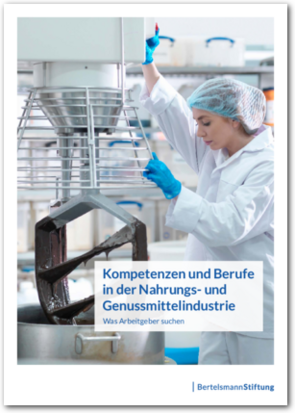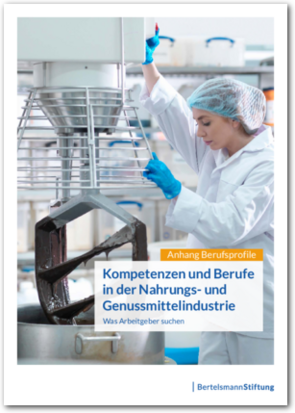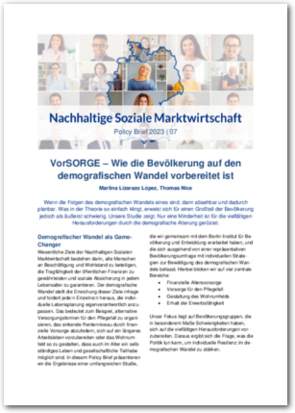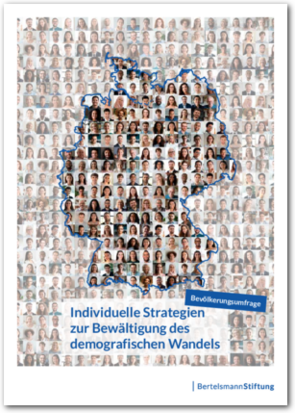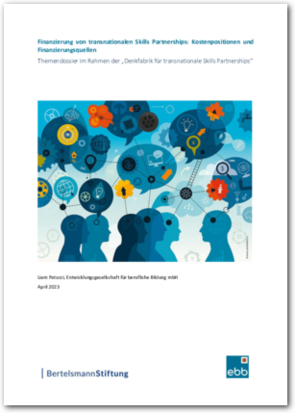Alle Publikationen
Bertelsmann Stiftung (Hrsg.) (PDF)2023
Wie die Bevölkerung auf den demografischen Wandel vorbereitet ist
Wenn die Folgen des demografischen Wandels eines sind, dann absehbar und dadurch planbar. Unser Policy Brief zeigt: Was in der Theorie so einfach klingt, erweist sich für einen Großteil der Bevölkerung jedoch als äußerst schwierig.
weiterlesenBertelsmann Stiftung (Hrsg.) (PDF)2023
VorSORGE – Wie die Bevölkerung auf den demografischen Wandel vorbereitet ist
Die Studie analysiert auf der Grundlage einer repräsentativen Bevölkerungsumfrage, wie Einzelne den Folgen des demografischen Wandels begegnen können, und diskutiert politische Handlungsbedarfe, um individuelle Resilienz zu stärken.
weiterlesenBertelsmann Stiftung (Hrsg.) (PDF)2023
Individuelle Strategien zur Bewältigung des demografischen Wandels
Die Umfrage zeigt, wie die Bevölkerung auf den demografischen Wandel blickt, wie sie für das Alter und den Pflegefall vorsorgt, sich im Job fit hält, über welche finanziellen Spielräume und Wohnsituation sie verfügt und wie belastbar ihre sozialen Netze sind.
weiterlesen(PDF)2023
Auf den Punkt | Kompetenzen und Berufe in der Nahrungs- und Genussmittelindustrie
Die Nahrungs- und Genussmittelindustrie in Deutschland ist eine Wachstumsbranche. In den zurückliegenden Jahren ist die Zahl der Beschäftigten kontinuierlich gestiegen, zuletzt um 1,9 Prozent auf 638.000 Mitarbeiter:innen. Die Digitalisierung und die Transformation zur...
weiterlesenBertelsmann Stiftung (Hrsg.) (PDF)2023
Kurzstationäre Grund- und Übergangsversorgung in Deutschland - Teil 3
Kurzstationäre Modelle der Grund- und Übergangsversorgung sind eine Möglichkeit, auf Versorgungsengpässe bei Veränderungen in der Krankenhauslandschaft zu reagieren. Aber wo im Spektrum zwischen stationärer, ambulanter und pflegerischer Versorgung sollten die Modelle...
weiterlesenBertelsmann Stiftung (Hrsg.) (PDF)2023
Geldpolitik in der Zeitenwende – Wie umgehen mit der Klimakrise?
Bertelsmann Stiftung; ebb Entwicklungsgesellschaft für berufliche Bildung mbH (Hrsg.) (PDF)2023
Finanzierung von transnationalen Skills Partnerships: Kostenpositionen und Finanzierungsquellen
Bertelsmann Stiftung (Hrsg.) (PDF)2023
Diskriminierung in der Einwanderungsgesellschaft
Die Studie beschreibt, wie sich Wahrnehmungen von Diskriminierung und Einstellungen zu Antidiskriminierungspolitik in Deutschland in den letzten 15 Jahren verändert haben. Dabei steht vor allem die ethnische, rassistische und religiöse Diskriminierung im Fokus. Zudem erfolgt...
weiterlesenTODO::Unterseiten
(0 Artikel)
0,00 €
